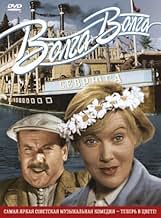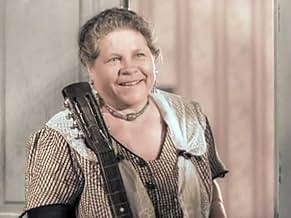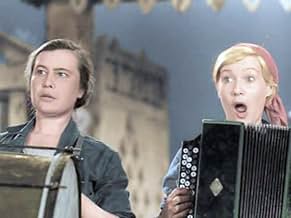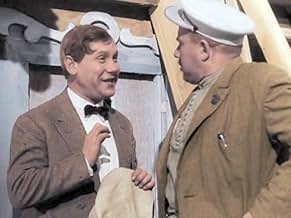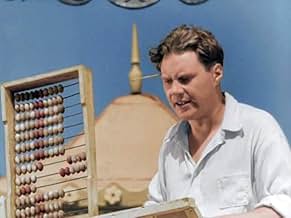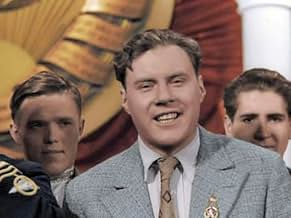Agrega una trama en tu idiomaWidely claimed to be Joseph Stalin's favorite movie, this classic musical comedy is a must-see. The action takes place on a steamboat on the iconic Volga River, as two groups of performers t... Leer todoWidely claimed to be Joseph Stalin's favorite movie, this classic musical comedy is a must-see. The action takes place on a steamboat on the iconic Volga River, as two groups of performers travel to Moscow to perform in the Moscow Musical Olympiad.Widely claimed to be Joseph Stalin's favorite movie, this classic musical comedy is a must-see. The action takes place on a steamboat on the iconic Volga River, as two groups of performers travel to Moscow to perform in the Moscow Musical Olympiad.
- Dirección
- Guionistas
- Elenco
- Premios
- 1 premio ganado en total
Anatoli Shalayev
- The Boy Musical Prodigy
- (as Tolya Shalayev)
Mariya Mironova
- The Secretary
- (as M. V. Mironova)
Nikita Kondratyev
- The Waiter
- (as N. S. Kondratyev)
Vsevolod Sanaev
- The Lumberjack
- (as V. V. Sanayev)
Alexei Dolinin
- The Militia Man
- (as A. G. Dolinin)
Ivan Chuvelyov
- The Olympiad Representative
- (as I. P. Chuvelyov)
Nikolai Khryashchikov
- Appearing
- (sin créditos)
Yakov Rykov
- Tugboat captain
- (sin créditos)
Lidiya Vinogradova
- Amateur Performer
- (sin créditos)
Opiniones destacadas
"Volga-Volga", directed by Alexandrov (Eisenstein's cameraman in "Ten Days" and other Soviet classics), is perhaps the best of a series by him that provides a Russian echo of Busby Berkeley's work in the US. Like Berkeley, Alexandrov has been attacked by some at present who see only the escapist side of this type of musical fantasy/comedy. But "Volga-Volga" also barbs "bureaucratic commissars" as did "Golddiggers of 1933" skewer "stuffy aristocrats".
Wonderful music and vaudeville-style entertainment, with Lyubov Orlova heading a talented cast, insured that "Volga-Volga" is perhaps the film most beloved by ordinary Russians ever made in the Soviet Union; it certainly was during the '30s and '40s. That Stalin presented a personal gift copy to Roosevelt during the war probably elicited the approbation "Stalin's Favorite Film". It was clear that he was proud of it, and we were allies. Today one would have to be a pretty unregenerate cold warrior or slavophobe to be offended by "Volga-Volga".
The plot: like with Berkeley, not so important. It involves a running competition (including a boat race down the Volga river) between a folk music band and a more formal village orchestra. There is singing, dancing, romance. And a happy ending.
Now you can judge for yourself. A crystal-clear VHS copy of this (and other Alexandrov '30s musicals) is distributed by Polart with easy-to-read yellow subtitles (I wish all foreign films were so graced).
Wonderful music and vaudeville-style entertainment, with Lyubov Orlova heading a talented cast, insured that "Volga-Volga" is perhaps the film most beloved by ordinary Russians ever made in the Soviet Union; it certainly was during the '30s and '40s. That Stalin presented a personal gift copy to Roosevelt during the war probably elicited the approbation "Stalin's Favorite Film". It was clear that he was proud of it, and we were allies. Today one would have to be a pretty unregenerate cold warrior or slavophobe to be offended by "Volga-Volga".
The plot: like with Berkeley, not so important. It involves a running competition (including a boat race down the Volga river) between a folk music band and a more formal village orchestra. There is singing, dancing, romance. And a happy ending.
Now you can judge for yourself. A crystal-clear VHS copy of this (and other Alexandrov '30s musicals) is distributed by Polart with easy-to-read yellow subtitles (I wish all foreign films were so graced).
How often do film reviews of American and British films begin by mentioning such things as Winston Churchill being the 20th century's greatest mass murderer for having killing over 7 million Indians in the Indian Holocaust in Bengal; 1 million Kenyans during the Mau Mau Rebellion, and millions more in other holocausts? As to the US, it has killed more people since WW2 in wars for oil profits than the Nazis could ever have dreamed about in WW2. If you want to talk about torture (Guantanamo), gulags (prisons), and a police state where only the rich have freedom, because they can buy justice, the US should be number one on your list. Yet, while there is no mention of any of these atrocities when American and British films are reviewed. So why is it everyone has to suffer every time they read a review of a Soviet film; reciting ad nauseum supposed atrocities committed by the Soviet Union and Stalin by people who have never been there and have no idea what the reality maybe. Why can't a film review actual begin by criticizing the merits or lack of merits in a film instead?
Is Volga Volga, Soviet film propaganda? Of course, but so is all film. Films cost millions to produce. You need financing. You need distribution. For example, ever wonder why you don't see poverty in American films? Quite simple, American films are self-censored by the Bankers/Financiers. American films are created to be both escapist fantasies for those in this country and to propagate to people abroad: Look capitalism is great-everyone owns their own home, drives a brand new car, and barely works. The American film industry is so successful, I have to fight with people abroad that according to the US Census Bureau figures ½ the US population lives at or near the poverty level. Why am I bringing this up? Because it would be nice if for a change a review of a Soviet film was actually concerned with criticizing the merits of a film rather than spewing rabidly anti-communist just for the sake of it. I hope this will be my contribution to this film review.
Volga, Volga is an exciting Russian musical comedy in the vaudeville tradition of historical interest. Stalin had numerous private screenings at the Kremlin; often teasing Khrushchev of his likeness to Byvalov, the corrupt, boorish, village bureaucrat. He was so was so proud of this film, he presented it to Roosevelt as a gift. Some say it was his favorite film.
Not as well-directed as many US musicals of the time, the film is at times a bit laborious to watch, especially in the beginning; and if you're Russian you won't catch some of the humor. However, these faults are easily overcome by its sheer energy, wit, and enthusiasm.
The film is an escapist fantasy with a politically-charged message. Made at a time when Russia was becoming more urbanized and industrial, the film depicts the charms of rural life. The simple plot seems to revolve around an engaged young couple and a musical competition taking place in Moscow. They break up as each tries to compete for who gets to Moscow first to perform. There is singing, dancing, romance and of course a happy ending.
What makes Volga, Volga a propaganda film? Is the fact, the people are shown to take actions on their own accounts. The main plot, easy to miss, revolves really around Byvalov and the rural community he is supposed to serve. From the beginning, we see a corrupt, self-serving official who only cares about "moving up". Forced to ride on a slow horse, because he refused to invest in any modern vehicles, he also refuses to allow the villagers to participate in the contest, feeling they are too backwarded to be talented. This forces the villagers to take matters into their own hands. As the villagers state at the end of the film: "We are glad you laughed! Opportunists like Byvalov are petty in their thoughts and actions. They obstruct our work: We must clean all the garbage. Sweep it away."
Contrary to popular misconceptions in West, the facts are that Stalin was trying to institute elections after WW2. However, the Comitern (the Soviet parliament) refused to vote for such measures; members like Khrushchev, who by the way hated Stalin and is partially credited for the anti-Stalin lies told about him.
A musical comedy. The famous work of the famous director Grigory Alexandrov and the actress Lyubov Orlova, beloved by millions at that time, as well as Comrade Stalin's favorite film, which he often reviewed. And how could you pass by such a thing? So the author of this review could not do this, and looked at the picture with great pleasure. And the final result rather pleased him. And here is a brief opinion - A good Soviet musical comedy of the late thirties. There were almost only advantages in it (with the exception of editing, but the author of this review will tell you about this in a separate paragraph), but for now you should finish the introduction and move on to the interesting.
So, here are the pros: 1. The scenario - the picture tells the story of two amateur musical groups that go to Moscow to participate in the Olympics, and the leaders of these groups: Avdotya Petrova, nicknamed "Strelka" and Alexey Trubyshkin are lovers, which gives everything that is happening a whisper of piquancy. At the same time, the local bureaucrat Byvalov takes part in all this activity, who wants to "push himself" at the expense of talented people. The old pilot fits well into this company. There are many different situations waiting for them on the way, and in the final there will be a grand triumph. In addition, the creators even destroy the "fourth wall", which looks pretty good. In addition to the fact that the script here is easy, it also charges every viewer who looks at the picture with a great mood. It's worth a lot.
2. Humor - there are frankly funny moments, and a lot of funny situations, and outright antics of some actors (in most cases it works correctly). Of course, wild laughter is not worth hoping for, although there is one point that strongly leads to this. The humor here is more mundane, and that's what catches on.
3. Songs and music - this picture can now be called a musical with full rights, since they sing and dance quite often here - and it turned out just great. The precision of the movements, and this despite the fact that some of the artists were already far from young. And the songs are pleasing to the eye and ear. Although there is not a single one that sticks in the memory (except classical music, which everyone knows). Although their text was written by Vasily Lebedev-Kumach.
4. The life of the USSR in the thirties - we will be shown the Volga-Don Canal, which was one of the great buildings of communism, musical competitions, and not only. They will show us how life itself is changing, how the achievements of the Soviet government made the dreams of ordinary people a reality. And although the scenario line with Byvalov is reduced to humor, it reflects reality (which is still relevant).
Now it should be said about an important point that somewhat spoils the overall impression, namely the crooked installation, and the author of this review watched the color version of the painting, which was castrated in the fifties of the last century, and the original of 1938 has not been preserved (thank you tell the Cornhusker for this), so we cannot enjoy the original version. And it's lucky that they didn't paint the fully castrated version, because there is a black-and-white version from 1961, from where all mentions of Stalin, his images and busts were cut out. The installation was done very poorly and the glues are visible (this is written by a person who has been engaged in installation for a long time).
Separately, the author of this review wants to thank the artists Igor Ilyisky (bureaucrat Byvalov), Lyubov Orlova, Andrei Tutyshkin, Vladimir Volodin (old pilot), and all the others for the talented performance of their roles in this musical comedy. Now their acting will seem too "pompous" to many, but they tried anyway, and it's not for nothing that the picture has gained well-deserved popularity, and it's not for nothing that it has gained cult status in the country. You need to know the classics!
A score of 8 out of 10 and a recommendation to watch!
So, here are the pros: 1. The scenario - the picture tells the story of two amateur musical groups that go to Moscow to participate in the Olympics, and the leaders of these groups: Avdotya Petrova, nicknamed "Strelka" and Alexey Trubyshkin are lovers, which gives everything that is happening a whisper of piquancy. At the same time, the local bureaucrat Byvalov takes part in all this activity, who wants to "push himself" at the expense of talented people. The old pilot fits well into this company. There are many different situations waiting for them on the way, and in the final there will be a grand triumph. In addition, the creators even destroy the "fourth wall", which looks pretty good. In addition to the fact that the script here is easy, it also charges every viewer who looks at the picture with a great mood. It's worth a lot.
2. Humor - there are frankly funny moments, and a lot of funny situations, and outright antics of some actors (in most cases it works correctly). Of course, wild laughter is not worth hoping for, although there is one point that strongly leads to this. The humor here is more mundane, and that's what catches on.
3. Songs and music - this picture can now be called a musical with full rights, since they sing and dance quite often here - and it turned out just great. The precision of the movements, and this despite the fact that some of the artists were already far from young. And the songs are pleasing to the eye and ear. Although there is not a single one that sticks in the memory (except classical music, which everyone knows). Although their text was written by Vasily Lebedev-Kumach.
4. The life of the USSR in the thirties - we will be shown the Volga-Don Canal, which was one of the great buildings of communism, musical competitions, and not only. They will show us how life itself is changing, how the achievements of the Soviet government made the dreams of ordinary people a reality. And although the scenario line with Byvalov is reduced to humor, it reflects reality (which is still relevant).
Now it should be said about an important point that somewhat spoils the overall impression, namely the crooked installation, and the author of this review watched the color version of the painting, which was castrated in the fifties of the last century, and the original of 1938 has not been preserved (thank you tell the Cornhusker for this), so we cannot enjoy the original version. And it's lucky that they didn't paint the fully castrated version, because there is a black-and-white version from 1961, from where all mentions of Stalin, his images and busts were cut out. The installation was done very poorly and the glues are visible (this is written by a person who has been engaged in installation for a long time).
Separately, the author of this review wants to thank the artists Igor Ilyisky (bureaucrat Byvalov), Lyubov Orlova, Andrei Tutyshkin, Vladimir Volodin (old pilot), and all the others for the talented performance of their roles in this musical comedy. Now their acting will seem too "pompous" to many, but they tried anyway, and it's not for nothing that the picture has gained well-deserved popularity, and it's not for nothing that it has gained cult status in the country. You need to know the classics!
A score of 8 out of 10 and a recommendation to watch!
When Stalin ordered Alexandrov to make this movie, he said he only wanted to see the happy images of the simple rural people along the river Volga. One could say, Stalin wanted something that would prove to him his people are happy (even if he ordered others to lie to him to make the appearance of happiness). There's no real story or plot, there's just a number of folk dances and rituals thrown together in order to entertain. It's kitch that served only one purpose - to make a dictator happy. I wouldn't even classify this movie as a comedy, it's simply a musical, or better yet a recorded account of folk dancing and singing with some attempts to moderate the time in between the musical sequences. Thus you should not even look for the depth of the characters or the story. Were it made that way Alexandrov might have even been shot! This film could not afford to be critical. IT was made in an era of Soviet history when one could not express one's self as an artist, but had to do what the propaganda machine demanded of him.
Selfish uncommitted bureaucrat Ivan Ivanovich Byvalov (who looks like Mario Bros!) is the most interesting element in this very light-hearted slaptstick musical comedy by Grigori Aleksandrov, who also directed 11 years before October: Ten Days that Shocked the World. Volga-Volga has some curious background stories, such as the title coming from a jokingly suggestion by Charlie Chaplin when he and Aleksandrov were rowing together in the United States and the British filmmaker heard those words in the lyrics of a folk song sang by the Soviet. Another very curious story is that Volga-Volga is claimed to be the favorite movie by Joseph Stalin, what is particularly surprising, as there are many funny gags about things that did not work in URSS! The raft soon got bogged down, all local boats were broken and still being repaired, the mare for transportation lacked horshoes, the balalaikas crafted in the factory had the worst sound quality ever heard, and the telephone calls were absolutely unintelligible (additionally, the trip over the river eventually happens in a steamboat which is said that was gifted 30 years before by the United States, and all its only problem were originated by bad maintanance!). Besides all that, Byvalov was the archetypical ambitious bureaucrat who had no concern about the quality of the works he supervised, and his only interest was to reach the most important office, and closest to Moscow, possible. It is mentioned in the beginning of the film that Byvalov moved to another institution to work, getting closer and closer to Moscow, 20 times just in the last five years! He was only two weeks managing the balalaika craft factory but was already waiting for a call to a new job! Did Stalin identify himself with the character or was his vanity what made him like that his name was given to the steamboat of the trip from the Great Volga habour to Moscow?! As a matter of fact, the silly song in the very last minute of the movie says bureaucrats like Byvalov were rare an represented "the old years", in a laughable attempt to score some brownie points from the regime... Besides Byvalov's background and the mockery on production dysfunctionalities, another interesting element in the beginning of the movie is the brief change from romantic idealization to fierce anger between the couple who had opposite views on music: the man loved classic music and rhe woman liked folk one. That romantic comedy element endures throughout the film, until the predictable happy end. Before the steamboat trip, there is an eight-minute collective artistic presentation of the whole village to a frightened Byvalov that is awesome, very amusing and well done, perhaps onde of the nicest moments of the film, second only to the initial appearance of characters Byvalov and his sycophant assistant Zoya Ivanovna. Eventually, the story continues with a troublesome trip, musical team duels, a lot of rough-and-tumble, and misunderstandings. Overall, the film has ups and downs, some tepid moments and silly overacting, but also quite funny cartoonish musical slapstick and smart gags on Soviet life and society. While not a masterpiece from Soviet cinema, it is underrated and worth watching.
¿Sabías que…?
- TriviaFamously, this was Joseph Stalin's favorite film and he would often show off how well he knew it by performing every part just before the actors on screen.
- ConexionesFeatured in Komediya davno minuvshikh dney (1980)
Selecciones populares
Inicia sesión para calificar y agrega a la lista de videos para obtener recomendaciones personalizadas
Detalles
- Tiempo de ejecución1 hora 44 minutos
- Color
- Mezcla de sonido
- Relación de aspecto
- 1.37 : 1
Contribuir a esta página
Sugiere una edición o agrega el contenido que falta

Principales brechas de datos
What is the English language plot outline for Volga - Volga (1938)?
Responda
